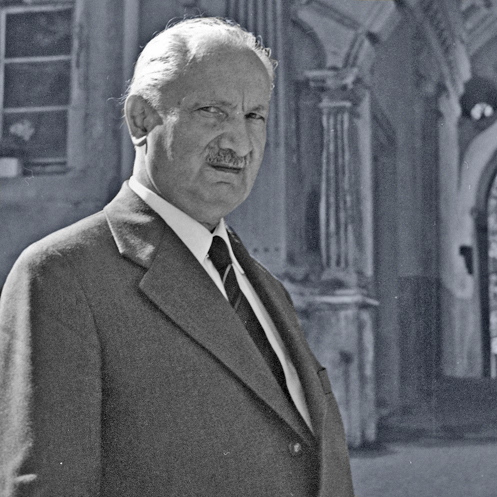
In 1924, philosopher Martin Heidegger met Hannah Arendt, a student in his philosophy class at the University of Marburg. After observing her for two months in class, he invited her to an office conference in which she spoke almost inaudibly, mumbling no more than “yes” or “no” in response to his questions. In order to speak on more intimate terms they struck up a correspondence, which had started only two months before to this letter’s writing. Swept up in their affair, Arendt wrote an autobiographical essay, never to be published, entitled “The Shadows” (“Die Schatten”) in which she revealed her girlhood insecurities which centered around her femininity and Jewish heritage. Below, Heidegger responds to these confessions, many of which were recorded in diary-like entries. In the following year, Arendt would leave Marburg, following the advice of Heidegger, in order to seek tutelage under the philosopher Karl Jaspers.
24 April [19]25
My Dearest!
When I gave you the manuscript today, your elementary joy overwhelmed me and made me helpless. I gave you a piece of my soul—little enough for your love—but your joyful gratitude towered over everything.
Was it chance that you brought along the manuscript when I intended to ask you for it, in order to give it back to you as a gift—a gift—as a symbol of how you will live in my work from now on—with the inexhaustible impulse of the “shy, retiring affection” that has helped you discover your essence with such extraordinary clarity.
Since I read your diary, I can no longer say “you don’t understand that.” You sense it, you—and follow along. There are “shadows” only where there is sun. And that is the foundation of your soul. You come straight from the center of your existence to be close to me, and you have become a force that will influence my life forever. Fragmentation and despair will never yield anything like your supportive love in my work.
Your letter to Kassel left me moved for days. The “if you want to have me”—“if you like”: what can I still do in the face of such shy and yet so resolute waiting, such persistence? What have I brought you but the most difficult burden, and has it not been a continual sacrifice of your soul? And your shy quiet “yes” in the train station. And as you forced me away from you, only then were you really close to me, and your essence revealed to me—at that moment you spoke—wordlessly—completely freely to me. Since that wondrous re-parting, which put me in your debt—I have been calm and happy about your life and its certainty and power.
“Shadows” were cast by your surroundings, by the age, by the forced maturity of a young life.
I would not love you if I were not convinced that those shadows are not you but distortions and illusions produced by an endless self-erosion that penetrated from outside.
Your startling admission will not undermine my belief in the genuine, rich impulses of your existence. On the contrary, for me it is proof that you have moved into the open—although the way out of such existential contortions, which are not really yours, will be long.
The background, surroundings, and possibilities of my life were simpler—in terms of keeping instincts under control, attaining objectivity and managing work easily—than that of many young people today. And as a result, it has been easy for me to do you wrong—even you—by understanding you. But the closeness of your being—and now your photographs—are so incontestable to me that, quite apart from knowing love, I will never believe you could or would live your life in “idle experiments.”—
You were so happy today when you arrived, sparkling and free, just as I hoped you would be on your return to Marburg. I was dazed by the splendor of this human essence—whom I am allowed to be close to. And when you asked—as I apparently seemed absent—if you should go, then I was with you—entirely alone—free of worldly cares and doubt—in the clear joy that you exist.—
I will be lecturing in room 11 again; do you know what that means?
Good night dearest Hannah!
Your
Martin.
From Letters: 1925-1975: Martin Heidegger and Hannah Arendt. Edited by Ursula Ludz. Harcourt: New York, 2003.
FURTHER READING
In 1933, Heidegger delivered a Rectoral Address, “The Self-Assertion of the German University,” in which he declared his support for Hitler.
Hannah Arendt wrote her Dissertation on Love and Saint Augustine after leaving Heidegger for the tutelage of Karl Jaspers.


